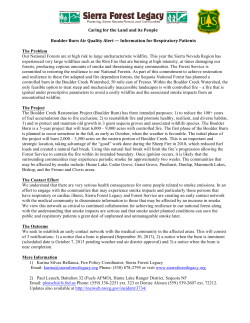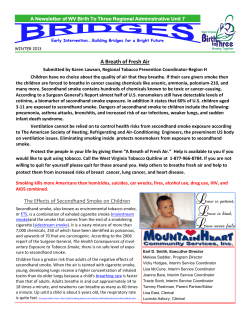
1 - Autodesk
Contents Chapter 1 Install . . . . . . . . . . . . . . . . . . . . . . . . . . . . . . . . . . . . . . . . . . . . . . . 1 Chapter 2 Configure Chapter 3 Troubleshooting . . . . . . . . . . . . . . . . . . . . . . . . . . . . . . . . . . . . . . . . . 5 Smoke . . . . . . . . . . . . . . . . . . . . . . . . . . . . . . . . . . . . . . . . 3 i ii Install 1 Verify that the hostname and Computer Name are the same 1 In a terminal, get the hostname of the workstation with the hostname command. 2 In Systems Preferences > Sharing, check that Computer Name is the same as the hostname. 3 If the names are different, change the Computer Name to that of the hostname, and then proceed with the install. If they're the same there's nothing more to do. OS X system preferences These must be set for each OS X user: ■ The OS X firewall must be off (default setting), otherwise it blocks incoming network connections. ■ By default the application uses keyboard shortcuts that conflict with the OS X default settings. In Keyboard > Keyboard, enable Use all F1, F2, etc. keys as standard function keys. ■ Sound: if you are using an AJA I/O device, ensure it is not selected for sound output. Install Smoke To install, the DMG files containing the installer are required, as well as an administrator account for the Mac. 1 Open the DMG image file, and double click Install Smoke, then click through the installer. 2 On the License tab, choose one of: ■ I want to try Smoke for 30 days. ■ I have a license for Smoke. In this case: 1 Chose License Type Standalone. Network licensing via ADLM Flexnet is not supported. 2 Enter the Serial Number you received from Autodesk. 3 The Product Key is always 982H1. 3 If the system has multiple drives, you may be prompted to choose a drive. For the media storage device it is recommended, but not required, to use a drive other than the Mac's system drive. Wherever you place the media cache, you can stop Spotlight indexing it from System Preferences > Spotlight > Privacy. 4 To launch Smoke, run Applications/Autodesk/Smoke 2016/Smoke 2016. The first time you launch Smoke, the application prompts you to go to the Autodesk Rental Licensing web page to activate your license, unless you're on the trial version. 1 The following is also installed. To see if the service is properly running, after installation go to: Applications/Autodesk/<product>/Utilities/Service Monitor. ■ Backburner Manager & Server: background renderer. ■ Wiretap Gateway: a background service used for media import. ■ Stone+Wire: tools installed with all Creative Finishing applications, except Lustre. Uninstall 1 Run Applications/Autodesk/Smoke 2016/Utilities/Uninstall. This leaves directories containing configuration files, project data and user preferences. These may be useful if Smoke is reinstalled. All versions of the application use /usr/discreet and it must be kept if you have other versions installed. 2 To optionally remove all files: 1 In a Terminal, run sudo rm -rf /usr/discreet /Applications/Autodesk/Smoke* according to which applications you want to delete. This cannot be undone. 2 The installer shares /usr/discreet over the network. To disable that, comment out the line /usr/discreet -network -maproot=root in /etc/exports, then restart the computer. 2 | Chapter 1 Install Configure Smoke 2 Configure the application with Smoke Setup Run /Applications/Autodesk/<product>/Utilities/Smoke Setup. If more than one version of Smoke installed, select the one to configure from the drop-down list at the top of the window. In the Preview and Vtr tabs, the Duplicate and Delete buttons apply to the selected entry, not the one checked under Active. To discard unsaved changes in all the tabs of the setup utility, click Reload. To edit the parameters directly in the application configuration file, click Manual Edit. Settings are stored in /usr/discreet/Smoke 2016/cfg/init.cfg. General Video Device The video output device to be used. Audio Device The audio output device to be used. If the does not have an AJA or BMD (Blackmagic Design) device, select CoreAudio to use the default sound card. The audio device must match the video device. CoreAudio may only be used if neither AJA nor BMD is set as the video device. Reserved Application Memory The amount of memory allocated to frame buffers used by modules such as the Player, Action, Input/Output clip. Sets the video MemoryApplication keyword in /usr/discreet/[product_name]/cfg/init.cfg. If set to Automatic, the MemoryApplication keyword is commented out in init.cfg, and memory is allocated according to the amount of system RAM: ■ 32GB or more: 33 per cent of RAM is allocated. ■ Less than 32GB: 50 per cent of RAM is allocated up to 4GB, or up to 3GB if less than 11.5GB RAM. Default Web Browser The Web browser used by the application. To use the Mac's default browser, set to open. Default Shortcut Profile Sets the keyboard shortcut configuration to be used. Menu Bar Sets whether the menu bar is displayed in the application. Table of Contents Location The path where online HTML and ASCII tables of contents are saved when archiving. The default location is /usr/discreet/archive. Single Screen This option is shown only if multiple screens are detected on the system. When enabled, the UI of the application is restricted to a single screen. 3 Preview Specifies the device used for the broadcast monitor connected through an AJA or Blackmagic Design device. Enable entries for the resolutions of projects, as well as the resolutions supported by the hardware configuration. If a device is changed after installation, settings must be updated. If no sync is connected to the workstation, enable some free run timings for broadcast monitoring. Enable the timings with a SyncSource set to freesync. Vtr If an AJA or Blackmagic Design device is connected to a VTR, enable the timings that might be used with the connected VTR. AJA devices support 3G-SDI connections. Blackmagic Design devices do not. Media Storage This is the path to where all imported and rendered frames are stored. It is recommended to use a fast drive, and not to use the system drive. To define a new media storage volume, click Add. Click Manual Edit to edit the configuration file in a text editor. Manual edit must be used to delete a storage volume. Parameters: ■ Name: a label to identify the media storage. Required. ■ Location: path to the media files on the storage device. Do not select the root of a drive, but create a subfolder to contain files. The recommended folder name is Autodesk Media Storage/. Required. ■ 8-bit Integer, 10-bit Integer, 12-bit Integer, 12-bit Packed Integer, and 16-bit Float. The file formats used when writing frames of those bit depths to the storage. Optional. ■ Jpeg Compression: can be set from 0 (lowest compression, highest quality) to 100 (highest compression, lowest quality). Optional. Backburner: configure background processing Manager Hostname The hostname or IP address of the Backburner Manager system that will handle background jobs. This enables the Background Wire and Background Proxies buttons in the application; they are otherwise greyed out. Configure Wacom pen buttons 1 Open the System Preferences / Wacom Tablet panel. 2 If Grip Pen does not appear in the Tool section, touch the pen on the tablet. 3 Select the Pen tab. 4 Ensure the top pen button is assigned to the double-click function, and that the bottom pen button is assigned to the right-click function. Advanced network configuration If the system is not using the correct network interface, for example wifi vs. ethernet, the local interfaces which should be used can be specified in /usr/discreet/cfg/network.cfg. Documentation about the syntax is in the file itself. A default device and a fallback device for data transfer and for multicasting can be hard coded in the file. 4 | Chapter 2 Configure Smoke Troubleshooting 3 Support and community ■ User forum on the Area ■ Smoke on Facebook ■ me.support@autodesk.com ■ Smoke Learning Channel on YouTube Hostname and Computer Name mismatch If Smoke has been installed without first verifying that the Computer Name and the hostname match, and if the application complains that Stone+Wire cannot start, try the following: 1 In a terminal, as root, create /usr/discreet/clip/. 2 In a terminal, get the hostname of the workstation with the hostname command. 3 In Systems Preferences > Sharing, check that Computer Name is the same as the hostname. Change the Computer Name to the hostname if they are different. 4 Using the Setup Assistant, under Media Storage, it should now be possible to add a new partition. The Setup Assistant is in Applications/Autodesk/[Flame Assist or Flare]/Utilities. 5 Start Stone+Wire using the Service Monitor application, also found in the Utilities folder. Repair media storage mount points ■ If the Mac experiences a hard reboot (for example a power outage) the when the Mac restarts the operating system may mount the media storage incorrectly (for example, /Volumes/Storage1 instead of /Volumes/Storage). In this case the media storage will be inaccessible. To delete an incorrect mount point: 1 Go to System Preferences > Sharing, and disable all the file services. 2 In Finder use command+shift+G to navigate to /Volumes. In Volumes/, find the incorrect mount point folder. It should have the name of the original mount point (for example, Storage), but its icon depicts a folder instead of a disk drive. 3 Delete the folder. 4 Restart the Mac. Restore System Preferences > Sharing settings. 5 If the media storage is still not available after restart, use the Mac application Disk Utility to repair the media storage disk. 5 Fix VOLUMEMGT and No Volume errors If a framestore volume cannot be selected, or if Error: VOLUMEMGT : Failed to initialize Stone+Wire connection is thrown: 1 Exit Smoke. 2 Open Applications /Autodesk/Smoke 2016/Utilities/Service Monitor. 3 Restart the Stone+Wire service and start Smoke. 6 | Chapter 3 Troubleshooting
© Copyright 2025









